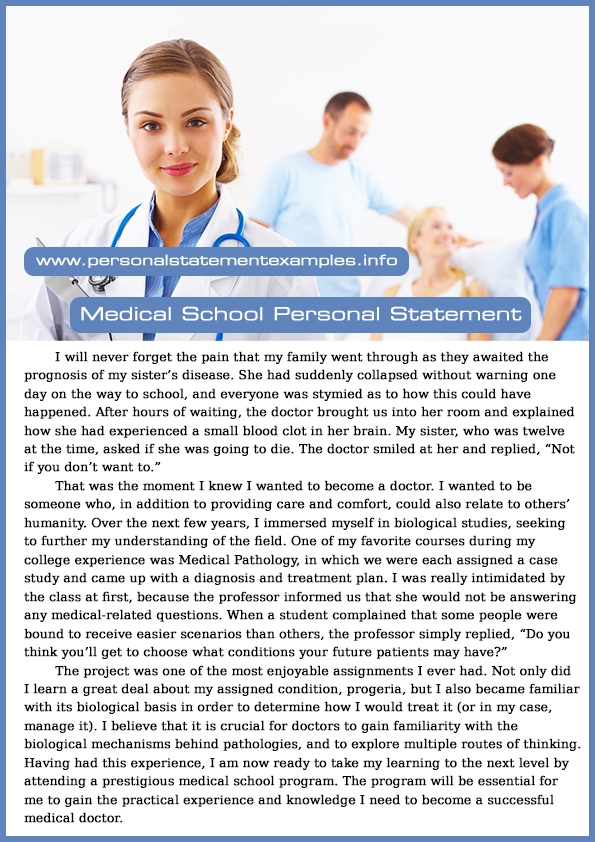Crafting a Winning Medical School Personal Statement: Top Examples

The path to medical school is arduous, paved with rigorous academics, challenging exams, and a deeply personal journey of self-discovery. At the heart of this journey lies the medical school personal statement, a crucial document that transcends mere grades and test scores. It’s your opportunity to breathe life into your application, to showcase not just your intellectual prowess, but your passion, your compassion, and your unique story.
Crafting a compelling personal statement is an art, not a science. It demands introspection, vulnerability, and a meticulous attention to detail. To guide you on this journey, we’ll delve into the anatomy of a winning personal statement, dissecting top examples and extracting the essence of what makes them stand out. Beyond the Checklist: What Admissions Committees Seek
Before we explore exemplary statements, let’s dispel a common misconception: your personal statement isn’t a laundry list of achievements. Admissions committees aren’t merely seeking a catalog of your accomplishments; they’re seeking a window into your soul. They want to understand:
Your “Why”: What ignited your passion for medicine? What experiences, encounters, or personal struggles fueled your desire to heal and serve?
Your Values and Ethics: What core principles guide your decisions and actions? How do these align with the ethical tenets of the medical profession?
Your Resilience and Adaptability: Medicine is a demanding field, requiring grit, perseverance, and the ability to navigate uncertainty. How have you demonstrated these qualities in your life?
Your Communication Skills: Can you articulate your thoughts clearly, concisely, and persuasively? Effective communication is paramount in medicine, both with patients and colleagues.
- Your Unique Perspective: What sets you apart from other applicants? What experiences, cultural background, or personal traits will you bring to the diverse tapestry of the medical community?
Dissecting Excellence: Exemplary Personal Statements
Let’s analyze two anonymized personal statement excerpts, highlighting the elements that make them shine:
Example 1: The Power of Storytelling
“The scent of antiseptic and the hum of medical equipment were familiar companions during my childhood visits to my grandfather’s dialysis center. Watching him battle kidney disease with unwavering optimism, I witnessed the transformative power of medicine – not just in treating illness, but in preserving hope and dignity. Those experiences planted the seed of my aspiration to become a nephrologist, driven by a desire to alleviate suffering and empower patients like my grandfather.”Strengths:
Emotional Resonance: This opening immediately engages the reader through vivid sensory details and a personal connection.
Clear Motivation: The author explicitly links their childhood experiences to their specific career goal, demonstrating a genuine passion for nephrology.
Focus on Patient-Centered Care: The emphasis on “hope and dignity” highlights the author’s understanding of the holistic nature of medicine.
Example 2: Demonstrating Growth and Reflection
"My initial encounter with medicine was through volunteer work at a local clinic, where I witnessed the stark disparities in healthcare access. While initially overwhelming, this experience sparked a deep commitment to addressing social determinants of health. Through subsequent research on healthcare policy and community outreach initiatives, I've developed a nuanced understanding of the systemic barriers to equitable care and a burning desire to be part of the solution."
Strengths:
Demonstrated Growth: The author acknowledges their initial naivety and showcases how their experiences shaped their perspective and fueled their commitment to social justice.
Action-Oriented: The mention of research and community outreach demonstrates proactive engagement with the issues they care about.
Alignment with Medical Values: The focus on healthcare equity aligns with the core principles of medicine, emphasizing the author’s dedication to serving underserved populations.
Crafting Your Own Masterpiece: A Step-by-Step Guide
Brainstorm and Reflect: Dedicate time to introspection. What experiences have shaped your desire to become a doctor? What values drive you? What challenges have you overcome?
Identify Your Unique Angle: What sets you apart from other applicants? Is it a particular cultural background, a unique volunteer experience, a research project, or a personal struggle that has shaped your perspective?
Structure Your Story: Organize your thoughts into a clear narrative arc with a beginning, middle, and end. Consider using the “Show, Don’t Tell” principle, illustrating your qualities through concrete examples rather than simply stating them.
Write with Authenticity: Be genuine and let your voice shine through. Avoid cliches and overly formal language. Admissions committees want to hear your unique story, not a generic template.
Revise and Edit Ruthlessly: Writing is a process of refinement. Seek feedback from trusted mentors, professors, or professional editors. Polish your statement until it is clear, concise, and impactful.
Beyond the Statement: A Holistic Approach
Remember, your personal statement is just one piece of the puzzle. A strong application requires a holistic approach:
Academic Excellence: Maintain a competitive GPA and MCAT score.
Clinical Experience: Gain hands-on experience through volunteering, shadowing, or research.
Extracurricular Activities: Demonstrate your well-roundedness and commitment to service through involvement in clubs, organizations, or community projects.
Letters of Recommendation: Cultivate strong relationships with professors, mentors, and supervisors who can speak to your abilities and character.
The Journey Ahead
Crafting a winning medical school personal statement is a challenging but deeply rewarding endeavor. It’s an opportunity to reflect on your journey, articulate your aspirations, and showcase your unique potential as a future physician. Remember, authenticity, passion, and a commitment to serving others are the hallmarks of a truly compelling statement. As you embark on this journey, embrace the process, trust your voice, and let your story shine through.
How long should my personal statement be?
+Most medical schools have a word limit, typically around 500-750 words. Adhere strictly to these guidelines.
Should I focus on a specific medical specialty in my statement?
+While mentioning a specific interest can be beneficial, avoid being overly narrow. Focus on your broader passion for medicine and the qualities that make you a strong candidate.
How important are grammar and spelling?
+Impeccable grammar and spelling are essential. Proofread meticulously and consider having multiple people review your statement for errors.
Can I use humor in my personal statement?
+Use humor sparingly and only if it feels natural and aligns with your personality. Avoid offensive or inappropriate humor.
When should I start working on my personal statement?
+Start brainstorming and drafting early, ideally several months before the application deadline. This allows ample time for revision and feedback.
Your medical school personal statement is your chance to shine. Be authentic, tell your unique story, and demonstrate your passion for medicine. With careful planning, thoughtful reflection, and diligent revision, you can craft a statement that resonates with admissions committees and opens the door to your dream of becoming a physician.



